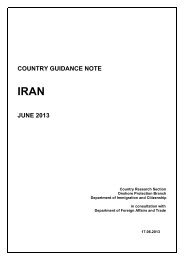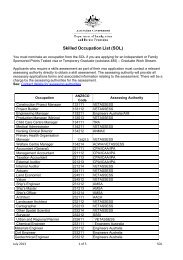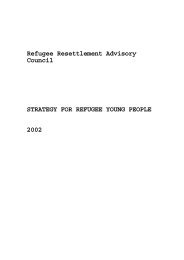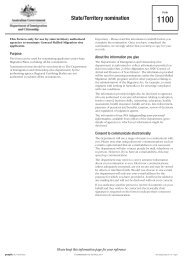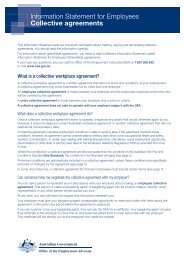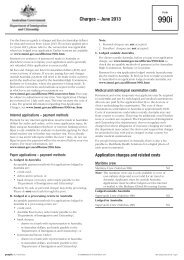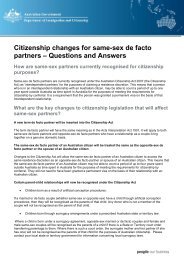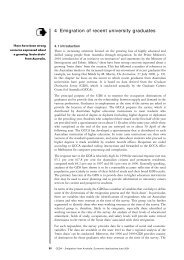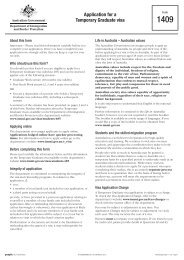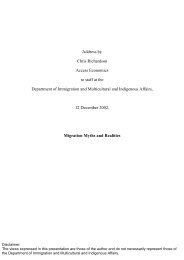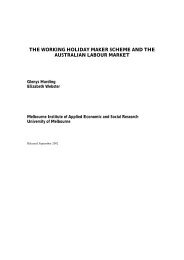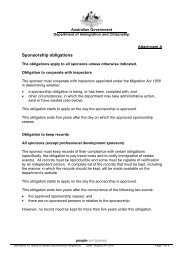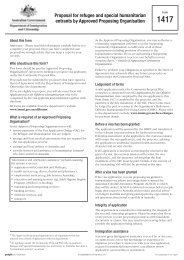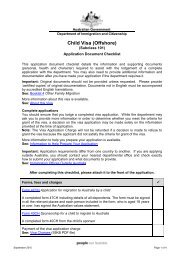Evaluation of the Integrated Humanitarian Settlement Strategy (IHSS)
Evaluation of the Integrated Humanitarian Settlement Strategy (IHSS)
Evaluation of the Integrated Humanitarian Settlement Strategy (IHSS)
You also want an ePaper? Increase the reach of your titles
YUMPU automatically turns print PDFs into web optimized ePapers that Google loves.
particularly critical problem for proposers who are illiterate, and for some smaller ethnic groups<br />
who do not have a written language.<br />
<br />
<br />
<br />
<br />
<br />
<br />
<br />
<br />
Tendency to only link entrants with services that <strong>the</strong> proposers have used <strong>the</strong>mselves. An EHAI<br />
provider reported that from its observations proposers never refer clients to services with which<br />
<strong>the</strong>y have not had personal contact. Notwithstanding <strong>the</strong> information provided by PS, proposers<br />
might not be fully familiar with all <strong>of</strong> <strong>the</strong> appropriate services that entrants may require. Many<br />
proposer supported families are reportedly not linked to HFS or EHAI. This has occurred with<br />
some entrants who arrived and required urgent medical attention.<br />
The complex networks <strong>of</strong> services and <strong>the</strong> unclear boundaries between services that are<br />
available or unavailable to proposed entrants confuses and frustrates proposers, especially as<br />
<strong>the</strong>y may have arrived as refugees <strong>the</strong>mselves and had access to <strong>the</strong> full range <strong>of</strong> <strong>IHSS</strong> services.<br />
The fragmentation <strong>of</strong> <strong>IHSS</strong> services discussed previously presents particularly significant<br />
problems for proposers as <strong>the</strong>y do not always know where to go for assistance.<br />
Problems with accessing accommodation. As <strong>the</strong>y do not have access to AS, proposer<br />
sponsored families experience particularly acute difficulties in securing accommodation. As<br />
discussed above, finding accommodation can be a very challenging task even for AS providers.<br />
Competing in <strong>the</strong> private rental market is a complicated and difficult task, which many proposers<br />
and entrants are not equipped to undertake. Entrants may experience particular difficulty in<br />
finding accommodation in situations where <strong>the</strong> proposer/entrant relationship has broken down.<br />
Poor financial circumstances and living conditions. Proposers may <strong>of</strong>ten be in a poor financial and<br />
material situation to support entrants. For instance, proposers may have significantly indebted<br />
<strong>the</strong>mselves purchasing airfares and medical screenings for <strong>the</strong> entrants. They may have raised<br />
<strong>the</strong> money at <strong>the</strong> expense <strong>of</strong> <strong>the</strong>ir own well-being and living conditions (given that <strong>the</strong>y may have<br />
had difficulty securing employment, been reliant on welfare payments and needed to settle<br />
<strong>the</strong>mselves). Fur<strong>the</strong>r <strong>the</strong>y may have had continuing responsibilities to support family members<br />
living overseas.<br />
The families arriving now are putting <strong>the</strong>ir lives on hold to bring <strong>the</strong>ir o<strong>the</strong>r family<br />
members through.<br />
(PS provider)<br />
Volunteers and service providers reported that entrants <strong>of</strong>ten arrive to very poor conditions.<br />
Some proposers are found to have little or no food available, no refrigeration, or inadequate<br />
space to accommodate <strong>the</strong> entrants.<br />
Proposers may also be experiencing a range <strong>of</strong> o<strong>the</strong>r stresses and problems. For instance,<br />
stakeholders reported that family violence issues are a major concern with proposer sponsored<br />
families.<br />
Proposers may not always understand <strong>the</strong> level <strong>of</strong> commitment required to assist an entrant<br />
through <strong>the</strong> initial settlement process.<br />
Proposers’ circumstances may have changed since <strong>the</strong> original application process, given that<br />
<strong>the</strong>re is <strong>of</strong>ten a significant delay between this process and <strong>the</strong> entrant’s arrival.<br />
Proposers may deliberately over-state (or be overly optimistic about) <strong>the</strong>ir capacity to support<br />
entrants. This may arise from <strong>the</strong> fact that guaranteeing to provide proposer support may be <strong>the</strong><br />
only way to enable family members <strong>of</strong> <strong>the</strong> proposer to come to Australia.<br />
53<br />
<strong>Evaluation</strong> <strong>of</strong> <strong>the</strong> <strong>Integrated</strong> <strong>Humanitarian</strong> <strong>Settlement</strong> <strong>Strategy</strong> 27 May 2003



